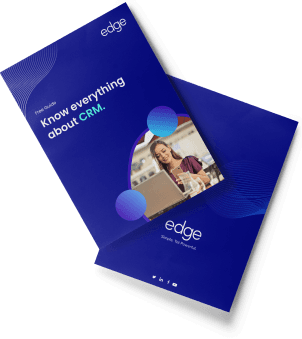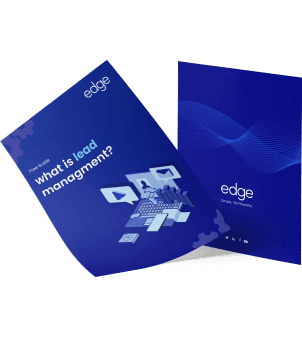At the time of this fierce competition in the insurance field, you should think of ways to dominate it. When you are experiencing growth, you must embrace and nurture every potential.
Moreover, the principal means of achieving such a goal is effective communication, an objective that can be realized by obtaining the best insurance CRM for agents. This ensures the facilitation of work process management. Insurance agents and brokers encounter various tasks and clients daily. From phone calls to discussions and appointments, they are the busiest.
Therefore, proper and consistent task management should be developed, as it is a possibility that an agent can forget essential duties. CRM software for insurance which is user-friendly and embraces all the necessary features, is an irreplaceable tool for your company.
To begin with, let's explore the definition of insurance CRM and agents' challenges to appreciate the CRM's role in the business world.
What is an Insurance CRM?
Insurance CRM is a solution that offers you the ability to establish long-term relationships as well as to retain customers. Being comfortable while conducting your day-to-day activities of dealing with customer service reps like lead capturing, workflow management, and activity tracking, to name a few, CRM will do it all for you!
CRM software for Insurance is meant solely for companies and insurance agents. It helps them secure more customers by converting potential ones into customers. At this time, an intelligent data management system is crucial for satisfying the needs of many people. Therefore, here is how a CRM can help to be different from the masses.
Challenges Insurance Agents Face Every Day
The insurance industry is highly competitive, and agents face numerous challenges to manage their clients and grow their businesses. Agents struggle between close competition and inefficient workflows with the countless obstacles they deal with every day.
Here are some of the common challenges insurance agents face:
1. Intense Competition
Have you experienced a customer who asked about your services, and surprisingly, the next time you call them, they tell you they switched to a competitor? It is a more typical scenario than you might consider, especially in the contemporary speedy market. A single minute's delay in a customer's request can be enough for them to try a rival company. Differentiating an agent from the crowd might be achieved by adopting automation technology, which ensures the work remains to be completed accurately, and this means focusing on only high-essential activities that directly involve customers.
2. Fragmented Sales Process
The usual spreadsheet and manual data entry might give the impression of trustworthy tools, but they often cause fragmented data, and client information needs to be in order. With all the information a sales representative needs to manage here, these mistakes can occur. Data needs to be managed, stored, and assessed correctly, which results in the breakdown of the client-agent relationship. Insurance companies are implementing custom CRM reports for employees, which can aid workflow automation and reduce errors.
3. Inefficient Workflow
Stringently stuck work mechanisms sometimes bar the entire operation, creating and losing opportunities for effective time utilization. Incorrect completion of tasks like policy processing, renewals, and follow-ups is not done automatically and can lead to inaccuracies. A poor workflow is always a bottleneck that slows productivity, affecting revenue growth. The key to increasing productivity and simplifying processes is to employ insurance companies that use innovative, automated workflows.
4. Lead Generation Challenges
Customers wanted no hassle and instantly effective solutions. Each additional stage the customers have to go through to purchase, the smaller the possibility of their conversion. Insurance agents must think outside the box to find lead-capturing strategies that fast-track the process and give instant solutions. Lead generation becomes a tricky thing to do if there is no concise and successful strategy.
5. Customer Retention Issues
Customer retention is equally as significant as the acquisition of new ones. In case the problems of disorganization and ineffectiveness affect your performance, the fact you are having difficulties retaining customers is no wonder. A good CRM solution can improve the relationship between you and the customers through the automation of tasks, interaction management, and compliance with the service to be given within a specific time limit.
With a CRM as a new part of your insurance organization, you can return to the basics and forge a more direct process. The automation tools decrease errors, improve effectiveness, and enhance customer relationships. Thus, you can have the instruments to beat other companies in the market.
5 CRM Software for Insurance Agents and Their Features
Insurance agents always need to secure the right CRM software program capable of optimizing the working process, client relationships, and competitiveness. Here are five top CRM software solutions designed specifically for the insurance industry:
1. Salesforce for Insurance
Salesforce has now become a precious CRM software for insurance providers due to its completely customizable CRM system designed to meet the different and particular needs of the insurance industry. For insurance agents and brokeInsuranceforce, it is more than just a tool to track leads; it can manage customer relationships, automate tasks, and scale the business. Therefore, it is the most effective tool for driving growth and customer satisfaction in the long run.
Salesforce for Insurance insurances and brokers present an undisturbed and personalized milieu for policyholders, thus ensuring customer retention and enhancing service quality. Whether managing claims and renewals, keeping compliance, and facilitating better communication, Salesforce solutions are precisely for this to make insurance teams more effective, responsive, and data-driven.
Features:
Customizable dashboards for a comprehensive view of client data.
Lead and opportunity management tools to track sales and conversions.
Automated workflows for tasks like policy renewals and reminders.
Mobile access for on-the-go client management.
Integrated communication tools (email, phone calls, social media).
2. Zoho CRM for Insurance
Zoho CRM is a flexible and budget-friendly tool that helps insurance agencies of different sizes handle their clients effectively, automate their sales processes, and enhance their lead generation and tracking. Zoho CRM is a well-known solution for its simplicity and customizable interface. It is purpose-built for insurance professionals to stay organized, strengthen customer relationships, and increase sales without costly CRMs. Through the integration of different channels and the centralization of data, Zoho CRM software for Insurance giInsurancegle view of every customer. Thus, agents can provide tailored services and differentiate themselves from the competition.
Zoho's functionalities are a direct response to the specifications of the insurance sector; thus, it is straightforward to capture leads from many sources, guide them through the sales process, and maintain high customer engagement. Powered by solid automation, insightful analytics, and marketing tools, Zoho CRM for insurance agents allows agents to do what they do best: build relationships rather than wasting time on repetitive administrative tasks.
Features:
Lead and contact management from multiple sources (email, social media, web forms).
Sales pipeline management to track prospects and clients.
Email marketing integration for personalized campaigns.
Advanced analytics and reporting tools.
Task automation for follow-ups, reminders, and policy renewals.
3. VCA Claims Management Software
VCA Claims Management Software is a customer relationship management system built specifically to make claims handling in the insurance sector as simple and productive as possible. VCA Software optimizes the claims life cycle, maximizes the handlers' productivity, and delivers excellent service to policyholders. Its flexibility and ease of integration have been commended, and so have the claims handlers who can more efficiently supervise different sections of the claims process, from initial reporting to final settlement. By doing so, the software's self-directed functions and real-time capabilities enhance response times and offer a transparent and responsible experience for the clients.
VCA does provide a standards-based complete claims management solution. Yet, it outshines other vendors in the insurance space with its smooth attachment to the existing policy and underwriting software, allowing a singular operation of customer service. By slashing administrative entanglement and discontinuing human decision-making in favour of data-based ones, VCA CRM software for insurance agents acts as a catalyst for the insurance entities to exceed the expectations of their clientele, while resource distribution also a significant contributor to this technology's efficiency in a cutthroat insurance market.
Features:
Real-time access for claims handlers to update details remotely.
Instant digital payments for faster claim resolution (15 seconds).
Mobile app for policyholders to report claims and track progress.
Integration with policy administration and underwriting systems.
Interactive analytics dashboards for claims insights and reporting.
4. HubSpot CRM for Insurance
HubSpot CRM is a very accessible and user-friendly platform containing the basic things an insurance agent needs to take care of his leads and make client communication more effective, thus optimally proceeding with the sales process. Renowned among small to medium-sized insurance businesses for its cleverly designed and easily integrated marketing and communication tools, HubSpot CRM is a suitable choice for a company that wants to enhance customer relationship management without too many complications and low costs. The core CRM software allows insurance agents to easily capture leads, automate repetitive tasks, and monitor sales progress, which eventually helps them build better relationships with their clients and increase policy conversions.
HubSpot CRM provides agents with real-time visual updates on their sales activities, the possibility to automate follow-up, and the opportunity to personalize communication, which consequently improves the agents' responsiveness and customer satisfaction.
Features:
Lead capture and tracking from forms, chat, and email.
Task automation for follow-ups and reminders.
Integration with email, social media, and other tools.
Real-time engagement tools like live chat and email tracking.
Visual pipeline management for sales and prospect tracking.
5. Pipedrive CRM for Insurance
Pipedrive CRM software for Insurancisis is an incredibly orientational, easy-to-use platform that enables insurance agents to manage and track leads, deals, and sales pipelines. Pipedrive is a tool that allows you to create campaigns while still being powerful enough to give agents the freedom to do their job—closing deals quickly. This is especially the case for very organized insurance agencies. Pipelines are the main feature of Pipedrive, and it is straightforward to track a prospect, manage tasks, and ensure you don't miss any opportunities.
Pipedrive CRM is the tool that helps agents stay close to their clients, react quickly, and make the whole sales process stress-free with follow-up tools, easy email communication integration, and mobile access on the go.
Features:
Visual pipeline for managing leads and deals.
Email integration and tracking for accessible communication.
Activity and task tracking to ensure timely follow-ups.
Customizable stages to reflect the insurance sales process.
Mobile app for managing leads and sales on the go
Why Your Agency Needs a CRM for Insurance
CRM (Customer Relationship Management) technology has become an irreplaceable gadget for realizing new business strategies, which will help them make operations smoother, enhance client interactions, and drive increased productivity over time. To demonstrate its importance for agents in the insurance industry, CRM software helps these agents adhere to the demands of their clients in a timely and efficient manner as it becomes the guiding mechanism for relationship management.
Key Reasons to Implement a CRM for Your Insurance Agency
Enhanced Client Relationship Management: CRM software for insurance grants agents the ability to keep exhaustive records of every client interaction, from sensitive things like policy details, claim history, and drafts to personal notes. Such a centralized point of client data enables agents to convey service tailored to such a degree that in every interaction, they know and do what should be done. An agent who recalls a client's preferences and buying history has demonstrated to that client the act of valuing the relationship, which will result in trust and loyalty over time.
Proper Document Management: CRMs provide agents with a means of chronicling every client engagement, which includes everything from the policy details and, if necessary, the claim history, even if they are personalized notes. It provides a centralized view of client information for agents to deliver a finely tailored service and ensures that each interaction is informed and pertinent. When agents memorize their clients' preferences and history, they feel valued, which is a basis for long-term friendly and trustful relationships.
Increased Efficiency with Workflow Automation: CRM software for insurance insurance. Insurance efficiency of daily routine is achieved by an algorithm that takes over routine duties such as policy renewals, reminders of follow-ups, and claiming notifications obstacles. Drafts of the automated workflow are some of the things that take away agents' names. They can instead do some significant tasks like prospecting and relationship building, and the mistakes made by men were reduced, too. Due to this approach, the enhanced productivity of the agency translates directly into increased efficiency, with agents being able to care for even more customers at a time without compromising the quality of service.
Improved Lead Management and Sales Tracking: CRMs facilitate daily business operations by automating recurring tasks, such as renewals of policies, follow-up reminders, and claims notifications. Automated campaigns allow for the redeployment of agents' time in more valuable occupations, such as relationship-building or prospecting, while minimizing human error. This fact makes the agency more productive because agents, due to their efficiency, can now take care of a more significant number of customers than before.
Conclusion
The best CRM software for insurance agents is the one that enables them to automate business processes, handle client relationships in the right way, and boost production. From Salesforce's full-featured system to Zoho's budget-friendly flexibility, all CRM solutions we examined provide unique elements aimed at the particular needs of insurance professionals.
With the correct Insurance and CRM software, agencies can deal with lead generation, data fragmentation, and customer retention daily and improve workflow performance and quality of services simultaneously. A well-chosen CRM provides a more personalized client experience for agents and creates strong bonds that lead to loyalty and long-lasting success. CRM technology investment is a strategic decision that clearly will put your agency on the path to continued growth and competitive advantage in the insurance market.













